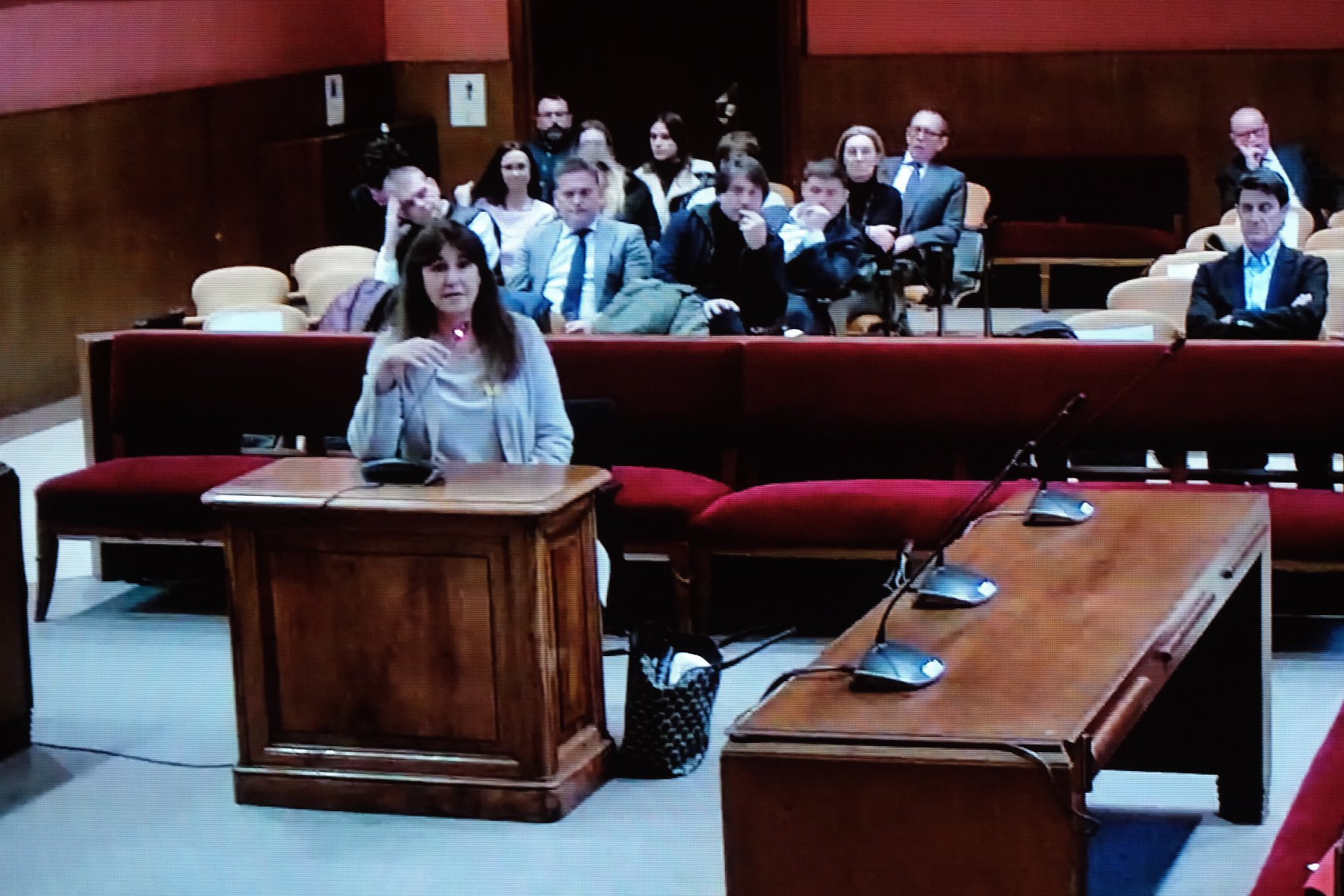"The law of contracts was never violated at the Institute of Catalan Letters (ILC)." With firmness, Laura Borràs clarified all the suspicions that exist about her management of this public Catalan entity between the years 2013 and 2017 and the contracts she granted to Isaías Herrero, which add up to more than 35,000 euros, to provide the organization with a powerful and innovative web portal. Borràs only answered the questions put by her lawyer, Isabel Elbal, but she did not fail to explain anything about the situation over which she is accused, in the seventh session of the trial against her, Herrero and Andreu Pujol at the Catalan High Court (TSJC), this Monday afternoon. "I never received any warning from the Catalan government auditors because they already understood that these were different projects, linked to the main web portal", she said, although there was a report warning about the excess fragmentation of contracts. The public prosecutors are demanding that the suspended speaker of the Catalan parliament and president of the Junts party be jailed for 6 years and banned from office for 21 years for crimes of document falsification and abuse of authority. Borràs's defence team, led by Gonzalo Boye, maintains that the institution did not pay 18 contracts based on a single project, but rather from four different projects, spread over different years, according to the defence's expert witnesses.
Borràs detailed that the-then administrator of the ILC, Assumpta Pagespetit, and subsequently Roger Espar, checked the contracts and validated her work, as did the auditor of the Catalan administration, because she maintains that she explained that "different projects within the website" were carried out - for example, the section dedicated to the anniversary of poet Joan Vinyoli. "Pagespetit was a demanding, thorough and inflexible employee. And a file that goes through her is a 10 out of 10", said Borràs, who did not want to assess why in the trial the employee assured that she had warned her boss that a negotiated contract, via an open public tender, was needed, instead of using so many minor contracts.
Digital artist
Earlier, Borràs had explained that she had met fellow defendant Isaías Herrero because of the two prizes he had won for digital literature in the Ciutat de Vinaròs awards, and he was then incorporated into the Hermeneia literature group. "I am surprised that Isaías presented himself at the trial as a simple computer expert, he is a digital artist", declared Borràs, and that is why she proposed the project of the Catalan Letters web portal to him, which she had been asked to get underway by the-then Catalan minister of Culture, Ferran Mascarell. Borràs explained that she ruled out linking the institution's new web portal to the Catalan government's IT and telecoms centre, the CTTI, considering that the centre's website had to be created "with greater quality, speed and lower cost", and that the CTTI carried the IT responsibility for the rest of the Institute. There were 11 people in the Institute and its web portal was presented in December 2013; "It was a team project", said Borràs. Then, the other projects were carried out, such as the Ramon Llull year - another sub-site focused on a specific Catalan writer, on the anniversary of his birth - between 2015 and 2016.
Laura Borràs tells the court about how Isaías Herrero came to be contracted for the web portal work: "He was a digital artist, a creator".
Herrero's problems
"It was not a covert contract. They were different projects with different singularities and I chose Herrero for his expertise". The suspended speaker of Parliament explained that she acted as an "intermediary" between Herrero and Pagespetit and detailed that after 2016 they had problems with Herrero. "He would disappear, he wouldn't give explanations, he wasn't himself. It was a distressing time," reported Borràs, who detailed that Herrero first told him that he suffered from depression and then that he was addicted to drugs.
Borràs insisted that there was also auditing in the administration, and if this department does not see it as correct, the contract is not paid, and that under her management no project was rejected in this way. She added that the Institute signed about 850 minor contracts a year and that they were always approved by the governing board.
Borràs: "At times Isaías Herrero lost patience with Assumpta Pagespetit and I often acted as an intermediary. About him, she said more than once 'we don't speak the same language'."
No budget made
To questions from her lawyer, Borràs stated that she did not make out any budget or invoice of those that Herrero presented to the ILC, and which the prosecutors use to accuse her of document falsification. In addition, the former director of the Institute stated: "Cooperatives are not cover-ups for false invoices, but comprehensive service management."
Everything stopped by direct rule from Madrid
Laura Borràs explained that she resigned from the Institute in January 2018, before the "M. Rajoy" government could take any action under Article 155, the imposition of direct rule over the Catalan administration following the 2017 independence referendum. Borràs justified that she called the Institute when she was no longer director to ensure that suppliers and artists were paid.
Borràs: "The governing board of the Institute knows all of the activity of the organization, about 850 minor contracts a year."
After the interrogation of Borràs, the trial continued with the reproduction of certain documentary evidence. Prosecutor Teresa Duerto had asked for the audios between Borràs and Herrero, and some of their emails, to be played. The court only admitted one of them.
The trial resumes on Wednesday, with the final session, at which the two prosecutions will announce whether, in the end, they will lower the sentence they are demanding for Herrero and Andreu Vidal, following the negotiations which these two defendants carried out prior to the trial. In addition, the lawyers will present their final reports.

